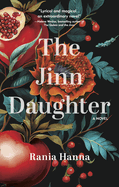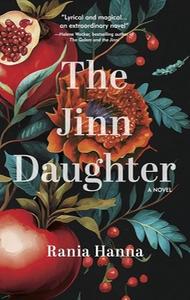
 Rania Hanna's first novel, The Jinn Daughter, is a moving, imaginative tale of magic, myth, life and death, and a mother's love. Appropriately, the power of storytelling is central.
Rania Hanna's first novel, The Jinn Daughter, is a moving, imaginative tale of magic, myth, life and death, and a mother's love. Appropriately, the power of storytelling is central.
Nadine is a jinn, and serves as Hakawati to her village and community. Every morning, she gathers the pomegranate seeds that have fallen overnight outside her modest cabin: these are the souls of the recently deceased. She presses these seeds into a juice and drinks it to experience the stories of the dead, sometimes with honey to cut the bitterness, sometimes "settling sweet on my tongue." It is in the telling of these stories that souls might pass from the Waiting Place "to final--and hopefully, peaceful--death."
This is important and meaningful work, but Nadine's life is not easy; almost all of her kind were killed or banished when she was very young, her training incomplete, and she is ostracized by the people whose souls she lives to assist into final death. She is nearly alone but for her beloved and cherished daughter, and the equally cherished ghost of that daughter's father, Illyas. Layala, at 14 years old, is beginning to test the limits of their austere life. Illyas had been a human, and Nadine desperately wants their child to be without magic--safer that way. But jinn, despite their many powers, don't have control over their children's destinies.
Layala seeks a more meaningful existence than the quiet life allowed her as her mother's daughter. Dangers press in from outside, too: the villagers' animosity toward jinn, and a cascade of secrets from Nadine and Layala's past, threaten their tenuous safety. They receive death threats from the human villagers, and then a visit from Death herself. Nadine must make unusual alliances and travel further into the realm of death than she ever has, to make a bid for her daughter's safety. Her recurring prayer: "Keep her safe. Keep her happy. Let her find good love. Let her know peace. Let her know her heart and mind. Let her be." But Layala may not want the same peace for herself that her mother wishes.
Hanna's prose sparkles with color and detail, imbued with a mother's deathless devotion to her child. The Jinn Daughter, drawing upon pre-Islamic Arabic mythology, engages with concepts of grief, loss, acceptance, self-determination, and the will to live. Hanna emphasizes the potential for stories and storytelling to explain life's mysteries, to communicate, and to survive. Readers will find Nadine's quest poignant, and Layala's growth inspirational, in this journey of love, life, and death. --Julia Kastner, librarian and blogger at pagesofjulia
Shelf Talker: A jinn with the power to help souls into death's final rest struggles to keep her daughter safe in this lively, vivid debut.

